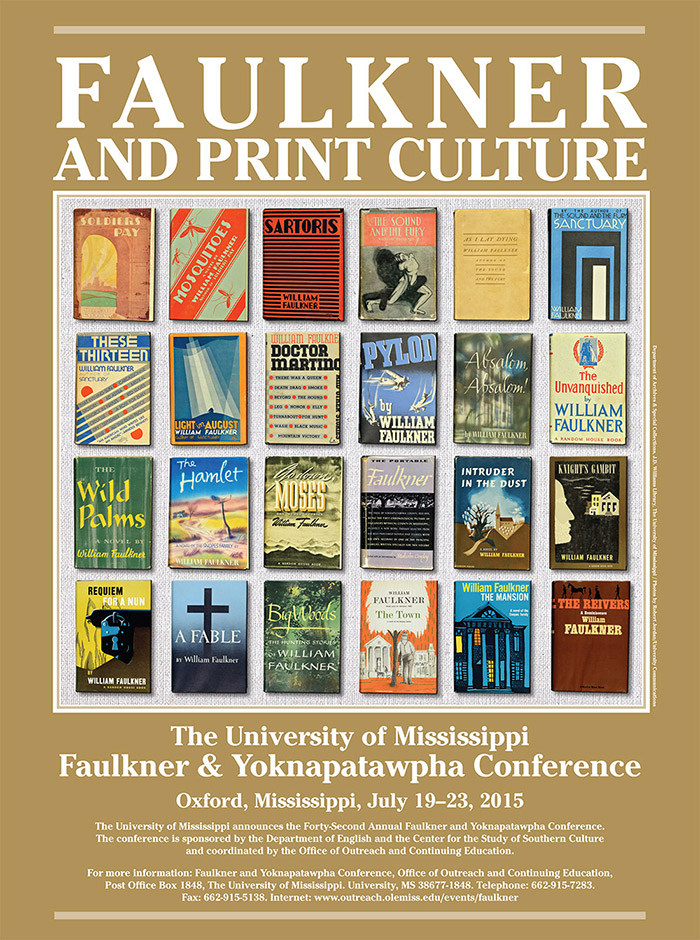
Panel. Faulkner's Collaborators
Location
Nutt Auditorium
Start Date
20-7-2015 9:30 AM
Description
- The Posthumous Return of the Author's Wishes: The Temporal Hues of the Folio Society Edition of The Sound and the Fury / Melanie M. Sherazi, University of California, Los Angeles
This paper considers the collaborative labor that produced the 2012 Folio Society limited edition of Faulkner’s The Sound and the Fury; this posthumous publication resurrects and enacts the late author’s wishes to render the novel’s opening section in colored ink to signal its temporal shifts. Addressing concerns his agent had over the section’s complexity and the difficulties it might pose to readers, Faulkner wrote to his agent, “I wish publishing was advanced enough to use colored ink … I’ll just have to save the idea until publishing grows up.” My talk will engage the temporal implications of this statement vis-à-vis the text’s own renowned formal and stylistic avant-gardism. Engaging editors Noel Polk and Stephen Ross’ collaborative labor in terms of print culture and editorial theory troubles an overreliance upon the author’s stated intentions, biography, and published oeuvre as interpretative methods. I explore the ways in which posthumous publication both resurrects and effaces the figure of the late author. The talk extends these ideas regarding posthumousness by elaborating the temporal dynamics of Quentin Compson’s time-obsessed meditations in The Sound and the Fury, and their rapport with his posthumous resurrection in Absalom, Absalom! - Absalom, Absalom! and Cold War Diplomacy / Laura Goldblatt, University of Virginia
Though William Faulkner’s novels were lauded in the 1930s, when he attended the Nobel Prize ceremony in 1951, all but one were out of print. My paper looks to this publication history to extend and complicate current readings of CIA sponsorship of modernist texts and authors during the Cold War. By analyzing the covert CIA support of Faulkner and his novel Absalom, Absalom! I suggest that cultural imperialism follows an economic logic of market exposure and saturation. Yet if the failures that haunt Absalom, Absalom! defy the CIA’s institutional aims, they also secure its place in the canon. - Du Bois v. Faulkner: The Debate / Richard Moreland, Louisiana State University
In 1956, W. E. B. Du Bois challenged William Faulkner to a debate on the courthouse steps where an all-white jury had recently acquitted the murderers of Emmett Till. Du Bois’s challenge marked a line in the sand, one limit to an especially public phase of Faulkner’s career. Faulkner had been encouraged by the Nobel Prize, the U.S. State Department, and the world press to write and speak on behalf of mankind, the free world, the nation, and both white and black Mississippians. The Reivers reflects on the limits of such public statements, and the unpredictable voices and futures they obscure.
Relational Format
Conference proceeding
Recommended Citation
Sherazi, Melanie M.; Goldblatt, Laura; and Moreland, Richard, "Panel. Faulkner's Collaborators" (2015). Faulkner and Yoknapatawpha Conference. 7.
https://egrove.olemiss.edu/fy/2015/schedule/7
COinS
Jul 20th, 9:30 AM
Panel. Faulkner's Collaborators
Nutt Auditorium
- The Posthumous Return of the Author's Wishes: The Temporal Hues of the Folio Society Edition of The Sound and the Fury / Melanie M. Sherazi, University of California, Los Angeles
This paper considers the collaborative labor that produced the 2012 Folio Society limited edition of Faulkner’s The Sound and the Fury; this posthumous publication resurrects and enacts the late author’s wishes to render the novel’s opening section in colored ink to signal its temporal shifts. Addressing concerns his agent had over the section’s complexity and the difficulties it might pose to readers, Faulkner wrote to his agent, “I wish publishing was advanced enough to use colored ink … I’ll just have to save the idea until publishing grows up.” My talk will engage the temporal implications of this statement vis-à-vis the text’s own renowned formal and stylistic avant-gardism. Engaging editors Noel Polk and Stephen Ross’ collaborative labor in terms of print culture and editorial theory troubles an overreliance upon the author’s stated intentions, biography, and published oeuvre as interpretative methods. I explore the ways in which posthumous publication both resurrects and effaces the figure of the late author. The talk extends these ideas regarding posthumousness by elaborating the temporal dynamics of Quentin Compson’s time-obsessed meditations in The Sound and the Fury, and their rapport with his posthumous resurrection in Absalom, Absalom! - Absalom, Absalom! and Cold War Diplomacy / Laura Goldblatt, University of Virginia
Though William Faulkner’s novels were lauded in the 1930s, when he attended the Nobel Prize ceremony in 1951, all but one were out of print. My paper looks to this publication history to extend and complicate current readings of CIA sponsorship of modernist texts and authors during the Cold War. By analyzing the covert CIA support of Faulkner and his novel Absalom, Absalom! I suggest that cultural imperialism follows an economic logic of market exposure and saturation. Yet if the failures that haunt Absalom, Absalom! defy the CIA’s institutional aims, they also secure its place in the canon. - Du Bois v. Faulkner: The Debate / Richard Moreland, Louisiana State University
In 1956, W. E. B. Du Bois challenged William Faulkner to a debate on the courthouse steps where an all-white jury had recently acquitted the murderers of Emmett Till. Du Bois’s challenge marked a line in the sand, one limit to an especially public phase of Faulkner’s career. Faulkner had been encouraged by the Nobel Prize, the U.S. State Department, and the world press to write and speak on behalf of mankind, the free world, the nation, and both white and black Mississippians. The Reivers reflects on the limits of such public statements, and the unpredictable voices and futures they obscure.

